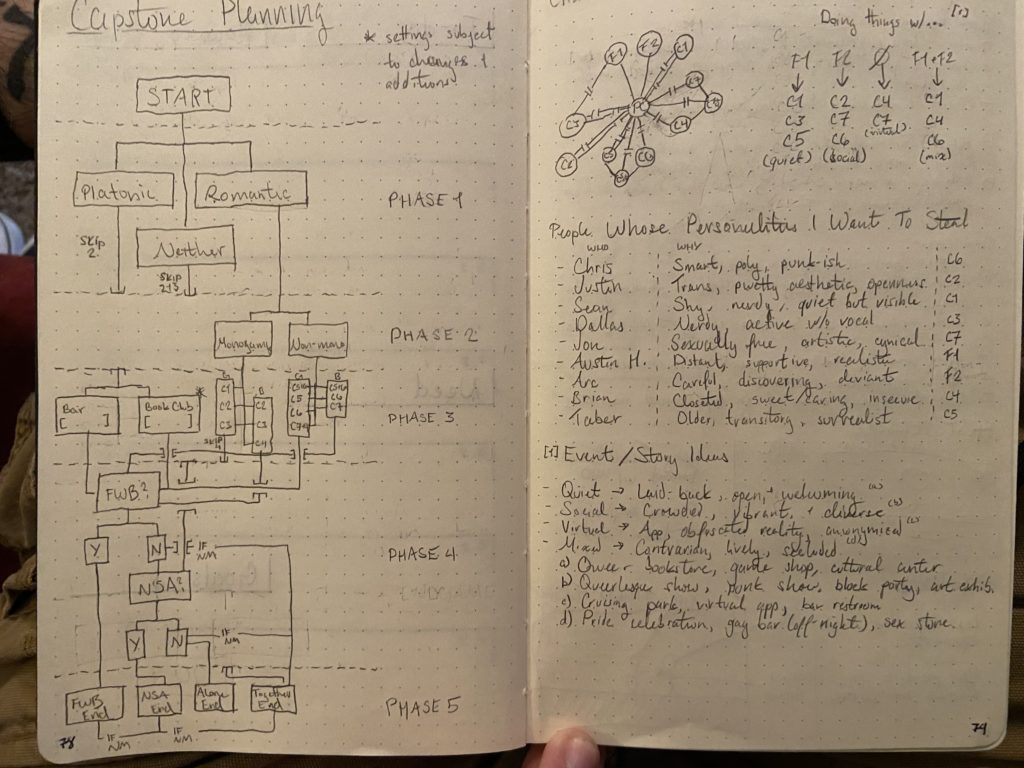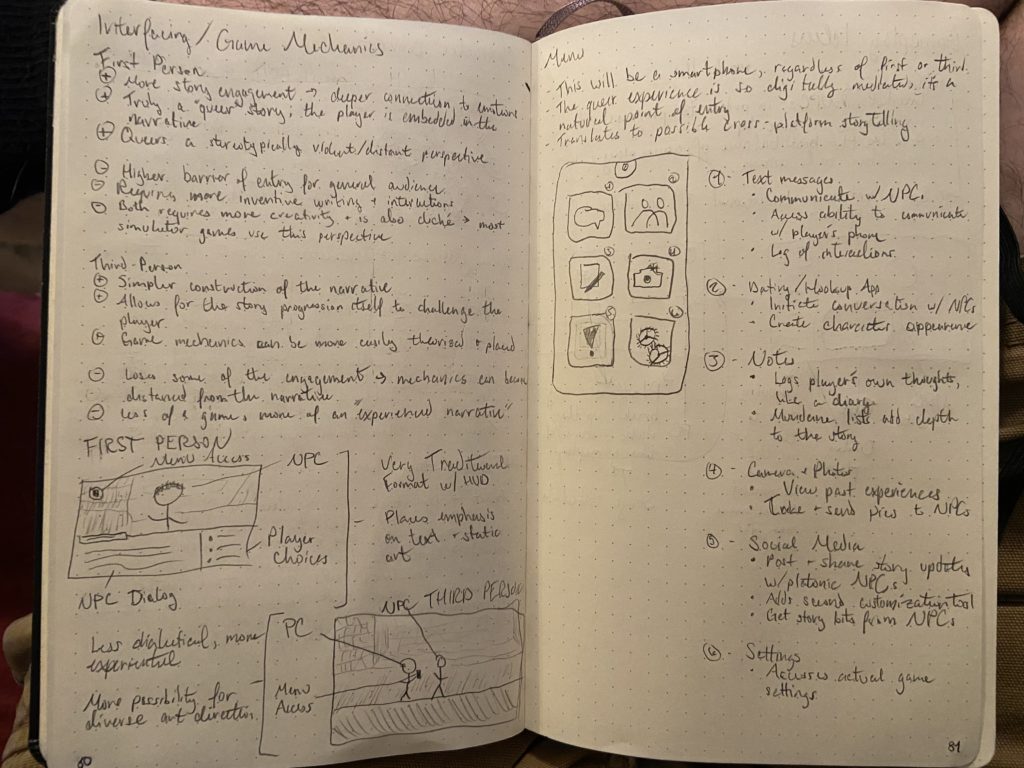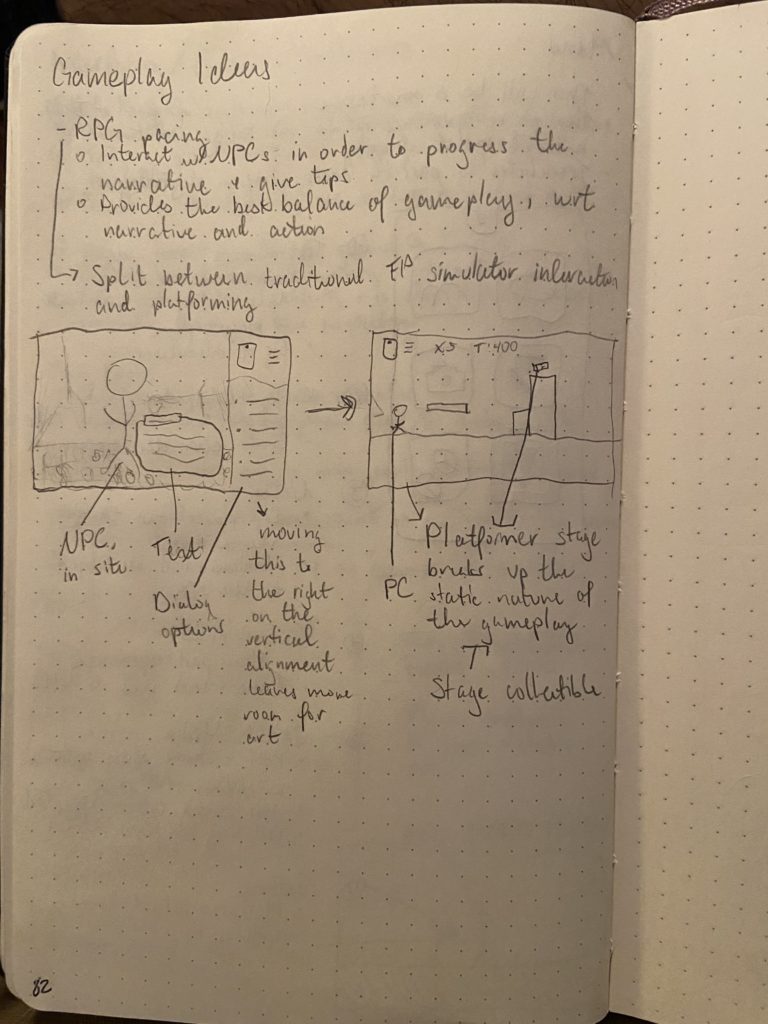All students who earned an EMAC or ATEC degree at UTD have to complete a Capstone Project, something that synthesizes the theory and production skills we all acquired during our time there. It’s a semester-long project, and I had the misfortune of having COVID-19 interfere with my capstone semester. That being said, I’m immensely proud of the work I was able to complete — the outline for a video game, to be called Out in the World.
Over the course of four months, I researched into media theory and game design under the eye of my supervisor, Dr. Heidi Cooley, and outlined and began to sketch out a narrative for the game. In addition, I also identified different inspirations and critiqued them using the theories I researched, while also identifying how they could inform my project.
Inspiration
The three pillars of inspiration I identified were:
- Coming Out on Top (2014), ObscuraSoft – Entirely self-produced by an pseudonymous British developer, Coming Out on Top is another dating simulator that errs on the side of humor. The player character is Mark, a college senior whose coming out to his roommates is the first event of the plot. Through his senior year of college, the player can explore six different relationship possibilities, all of which have endings with the characters together and apart. The audience the game is hoping to tap into is definitely more adult, relying on raunchier humor and frames of nudity as gifts for the successful romantic endings.
In tone, Coming Out on Top is a bit less approachable than Dream Daddy, but it addresses the themes of queer relationships with a much broader brush. Namely, sex becomes a part of the experience, which, for a lot of relationships, is more realistic depiction than a squeaky clean romance in a quaint town. That being said, a bit too much emphasis is put on that aspect of the story, and my project would seek to strike the right balance. In addition, Coming Out on Top has a bonus mode that lets the player explore a bit of app-based dating, as well as a polyamorous date. Both of these are small aspects of the game that I would hope to expand upon.
- Dream Daddy (2017), Game Grumps – Written by Leighton Green and Vernon Shaw, this game is probably the closest sibling to what I want my project to be. The game’s premise is incredibly simple; you’re a single dad in a new town, looking to date other dads. There are seven featured characters, along with their children, who all lead through a plot that sees the player character settle into life in Maple Bay. With a cutesy cartoon style, lots of humor, and a huge push by YouTube personalities turned publishes, the Game Grumps, Dream Daddy received a huge amount of acclaim for its inclusive storyline and heart when it was released in the summer of 2017.
Where I would expand on this project would be the greater emphasis on the relationships themselves; in Dream Daddy, many of the potential issues in the relationships with the dads are smoothed over and never addressed. There’s also very little attention given to the aspects of relationships deeper than just the characters being together. Using this game as a base, as well as media scholarship surrounding texts that successfully avoid turning into a kind of struggle porn for queer people, I think my project can further discussions that deserve to happen.
- Gone Home (2013), The Fullbright Company – Written and developed by a small team in Portland, Gone Home served as a sounding board to the other two examples. Whereas both of those were simulators in the RPG format, Gone Home utilizes an FPS mechanic, putting the player squarely in the environment of the Greenbriar Family’s home. Over the course of one evening, older sister Kaitlyn discovers the love story of her sister Sam, and her “friend” Lonnie.
The emotional intimacy designed into the gameplay in Gone Home is the clearest inspiration, as the nods to 90s teenage life (the cassette-bound mixtapes from Lonnie to Sam, at-home hair dye kits, analog cameras, witchcraft books, etc.) that get queer coded to tie into the story being told. As a narrative base for a story that might better suit a different mechanic, Gone Home is a brilliant jumping-off point.
Progress
Most of the work completed before the university-mandated deadline was conceptual. After finishing an annotated bibliography for all my sources, I began working on some different game concepts, including characters, narrative progression, and some interfaces. Most of my ideas existed as sketches.
Provenghi Nicholas – Annota… by Nicholas Provenghi on Scribd
Goals
Having laid down a solid foundation during my time with Dr. Cooley in the Great Indoor Semester of Spring 2020, I feel like I’ve created a great base to expand upon into the future. The most achievable of my goals would be to have a fully-written story, with character dialog and developed endings. From that point, I would want to build the world more, through moodboards, more-detailed sketches, and even some visual character concepts. Ultimately, working with more talented developers and artists would be my dream, but I’d like to start small.



